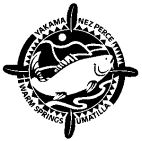
Portland, Oregon, 97232
Fax (503) 235-4228
www.critfc.org
 |
COLUMBIA RIVER INTER-TRIBAL FISH COMMISSION | |
|
729 N.E. Oregon, Suite 200, Portland, Oregon, 97232 |
Telephone (503) 238-0667 Fax (503) 235-4228 www.critfc.org |
|
| TO: | Brigadier General Strock | COE-NPD |
| Steven Wright | Acting BPA-Administrator | |
| William Branch | COE-NWD-NP - Water Management | |
| C. Henriksen, R. Turner | COE-NWD-NP-WM-RCC | |
| Doug Arndt | COE-NWD-Portland | |
| Lt. Col. W. E. Bulen, Jr. | COE-NWD-Walla Walla | |
| J. William McDonald | USBR-Pacific Northwest Regional Director | |
| G. Delwiche, T. Lamb, R. MacKay | BPA-PG-5 and BPA-PGPO | |
| FROM: | Don Sampson, Executive Director | |
| DATE: | July 17th, 2001 | |
| SUBJECT: | Lower Columbia FCRPS Summer Spill | |
The Columbia River Inter-Tribal Fish Commission, on behalf of its member tribes the Nez Perce Tribe, the Yakama Nation, the Confederated Tribes of the Umatilla Reservation, and the Confederated Tribes of the Warm Springs Reservation, requests the following operations for the Lower Columbia FCRPS projects.
SPECIFICATIONS:
Provide immediate 600 MW months of spill at the Spring 2001 levels:
Bonneville - 50 kcfs for 24 hours
The Dalles - 30% of daily average flow for 24 hours
John Day - 30% of daily average flow for 12 nighttime hours
McNary - 30 kcfs for 12 nighttime hours
JUSTIFICATION:
Lower river spill is essential, especially in a drought year, for the millions of listed and unlisted sub-yearling salmon migrating from and through the Lower Snake, the Mid-Columbia, and the Lower Columbia. WDFW current estimates of subyearling passage at McNary indicate that in excess of 400,000 salmon per week are passing through the dam. Spill should be extended to at the levels listed above to include the majority of the summer migration through August 2001, and if possible into early September 2001.
Passage indices indicate that there are millions of juvenile salmon now in the river and that 30% of the summer migration has passed mid-river points. Spill should be immediately implemented at levels previously implemented in the spring to "spread the risk" of hydrosystem passage. Using smolt-to-adult survival rates, negative transport to in-river ratios have been documented by PATH for summer migrants that are transported instead of left in the river via spill. Fish guidance efficiency rates in bypass systems are much lower for summer migrants than spring migrants and average only 50%. Temperatures in bypass and transportation facilities are much higher (>4 degrees F) than the ambient river, which can cause elevated direct and delayed mortality from disease, de-scaling, and physical injury. Juvenile salmon mortality rates at the McNary Dam bypass system have increased to nearly 6 % (WDFW McNary Temperature Report # 4). USBS studies indicate that lack of spill can cause migrants to move upstream instead of downstream. Spill is necessary to meet provisions of the Clean Water Act with respect to allowing the beneficial use, salmon, access to cooler water at depth in reservoirs and to avoid high temperatures in bypass systems. Additional justifications for summer spill are given in the Fish Passage Advisory Committee's Joint Technical Staff Memorandum dated June 21, 2001, which critiques the NWPPC's summer spill survival analysis.
At projects with nighttime spill, at dusk, turbine units should be sequentially shut down starting at the shore units and ending at the units next to the spillway. Migrants can be led to the spillway using this operation. NMFS studies at John Day have shown that a 15% reduction in mortality can be gained by this operation over not sequentially shutting down units, thus, more fish can by spill bypassed with less spill (Columbia River Fisheries Council 1979). Emergency spill should be implemented at all Lower Snake dams if bypass facility temperatures exceed the Clean Water Act temperature standard of 68 degrees F.
As of June 29, BPA’s reserves are at $560 million - well beyond the $300 million they claim is necessary to have by October 1, 2001. Further, the final July water supply forecast increased to 54.7 MAF, up from 53.9 MAF and is within the margin of error to the 55 MAF that BPA stated they needed in order to provide summer spill.
BPA also has access to a $250 million short-term Treasury note. Further, BPA is owed about $85 million by the California ISO, in which BPA could pursue as federal credit. According to the BPA's analysis using criteria that does not incorporate the above viable funding sources, 600-700 MW-month of spill could be allocated without risking power reliability shortages. At current market prices of $75/MW, BPA estimates that 600 MW-month would cost $33 million. This is less than half of what the California ISO owes BPA.
BPA has a many viable financial sources of funding options that they have yet to pursue that would easily accommodate the modest spill regime recommended by this SOR. Available power market opportunities exist. Exchanges and / or sales can be made now to purchase the 1500 MW-month additional storage cited in the NWPPC analyses for power system reliability. BPA does not "own" the river for its own financial gain. It is in the public interest to protect and restore salmon populations in the Columbia Basin. Given the critical status of the summer migration, BPA and the federal operators should begin summer spill immediately.
At the federal executive meeting on June 29, 2001, BPA told the region that they would reconsider implementing summer spill if conditions change. Power markets are down, the runoff forecast has increased and BPA has available financial tools to implement immediate summer spill as specified by this SOR. If this SOR cannot be implemented, we request a detailed written response from the federal operators as to why it cannot be implemented.